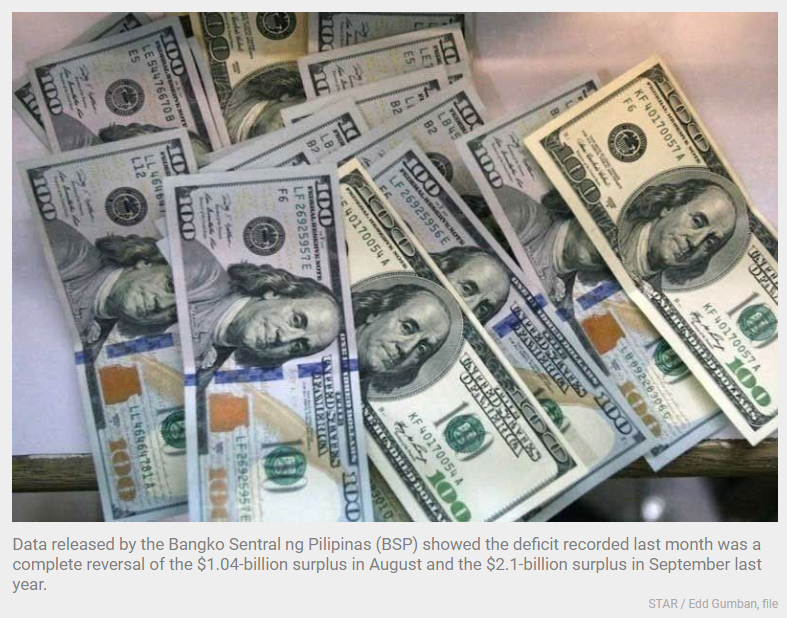Philippines: BOP back to deficit in September
Shortfall widest in 4 months
MANILA, Philippines — The country’s balance of payments (BOP) reverted to a deficit of $412 million in September, ending two months of surpluses, as the national government paid maturing foreign obligations.
Data released by the Bangko Sentral ng Pilipinas (BSP) showed the deficit recorded last month was a complete reversal of the $1.04-billion surplus in August and the $2.1-billion surplus in September last year.
“The BOP deficit in September reflected outflows arising mainly from the debt service payment of the national government’s foreign currency debt obligations,” the BSP said.
Michael Ricafort, chief economist at Rizal Commercial Banking Corp., said the September deficit was the widest in four months, or since the $1.4-billion shortfall recorded in May.
The BOP is the difference in total values between payments into and out of the country over a period. A deficit means more dollars flowed out of the country to pay for the importation of more goods, services and capital than what came in from exports, remittances from overseas Filipino workers, business process outsourcing earnings and tourism receipts.
Ricafort said the BOP deficit in September was partly brought about by wider trade deficit amid higher prices of imported oil and other global commodities that pushed up the country’s import bill to pre-pandemic highs and near-record highs.
From January to September, the BOP deficit reached $665 million, reversing the $6.88-billion surplus in the same period last year.
“Based on preliminary data, this cumulative BOP deficit was partly attributed to a wider merchandise trade deficit and lower net foreign borrowings by the national government compared to the same period last year,” the BSP said.
Latest data from the Philippine Statistics Authority showed the country’s trade deficit widened by 61 percent to $25.25 billion from January to August this year, against the $15.69 billion in 2020.
This was after imports jumped by 31 percent to $74.18 billion during the eight-month period from $56.59 billion, while exports increased by 19.6 percent to $48.93 billion from $40.9 billion.
Ricafort said recent measures to further reopen the economy in view of the shift to smaller granular lockdowns also led to some pickup in imports, as well as the net repayment of some of the country’s foreign debts.
Ricafort said the BOP data could improve from October to November in view of some of the proceeds of the $1.59-billion retail dollar bond issuance as well as some proceeds from other corporate fund-raising activities.
The RCBC economist also cited the increased investment banking transactions in the pipeline for November, all of which could entail some foreign investment inflows.
“Proceeds of more foreign borrowings and other fund-raising activities by the government and the private sector in the coming months would be added to the country’s BOP, which is the country’s cash flow statement with the rest of the world,” he said.
These inflows, Ricafort added, could offset the recent widening trend of the country’s trade deficit amid measures to reopen the economy in view of increased COVID-19 vaccinations that have significantly reduced new local cases.
“For the coming months, massive vaccination versus COVID locally and in some developed countries around the world toward herd immunity would fundamentally support economic recovery prospects, and thereby would, in turn, support increased structural/recurring US dollar inflows into the country such as remittances, BPO revenues, foreign investments, some pick-up in foreign tourism receipts and POGO revenues,” he said, referring to Philippine offshore gaming operators.
The BSP said the country’s gross international reserves (GIR) declined to $106.6 billion in September from $107.96 billion in August, but remained more than adequate external liquidity buffer equivalent to 10.7 months’ worth of imports of goods and payments of services and primary income.
The BSP is now looking at a lower BOP surplus of $4.1 billion instead of $7.1 billion this year and $1.7 billion instead of $2.7 billion next year after taking into consideration a more guarded view of global and domestic economic developments going into the remaining months of 2021.
It also expects the GIR to hit a record level of $114 billion this year and $115 billion next year.
Source: https://www.philstar.com/business/2021/10/27/2136885/bop-back-deficit-september


 English
English




